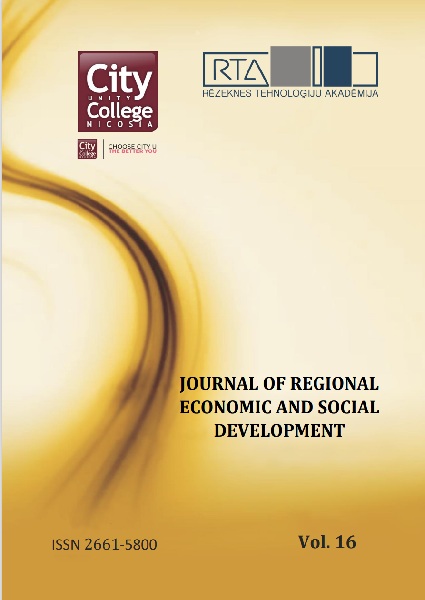ANALYSIS AND DEVELOPMENT POSSIBILITIES OF THE MANAGEMENT FUNCTIONS OF A HUNTING SOCIETY
DOI:
https://doi.org/10.17770/jresd2024vol16.8358Keywords:
hunting society, hunting, leadership functions, societyAbstract
Purpose and aim of the study: to perform an analysis of the management functions of hunting societies, identify internal and external factors that influence their performance, and propose ways for improvement.
Design/methodology/Approach: During the study, the activities of the hunting society have been described, the boards of directors of hunting societies have been interviewed, the strengths and weaknesses of the hunting society have been analysed, proposals have been developed for improvement of the activities of the hunting society.
Main Findings: The study examines how the society's leadership can contribute to sustainable resource use and protection. The hunting society must be effective and well-organised to perform its functions successfully.
Originality: The paper analyses the management functions of the hunting society as well as the possibilities to improve its management processes. The work of the hunting society and its management are also capable of influencing public attitudes towards hunting, as well as the use of natural resources.
Implications: The study development process analyses how to build successful collaboration with the rest of society, and how to successfully overcome the challenges facing hunting societies. For example, environmental change, lack of resources or negative public attitudes.
Downloads
References
Administratīvās atbildības likums. (2018.g. 25.okt.). Latvijas Republikas likums. https://likumi.lv/ta/id/303007-administrativas-atbildibas-likums
Bagnoli, L., & Megali, C. (2011). Measuring performance in social enterprises. Nonprofit and Voluntary Sector Quarterly, 40(1), 149–165. https://doi.org/10.1177/0899764009351111
Barney, J. B., & Hesterly, W. S. (2020). Strategic management and competitive advantage: Concepts and cases (6th ed.). Pearson.
Barton, D. N., & Størkersen, T. (2008). Sustainability in hunting: Sustainable use of wildlife. Ecological Economics, 67(3), 626–634.
Biedrību un nodibinājumu likums. (2003.g. 30.okt.). Latvijas Republikas likums.. https://likumi.lv/ta/id/81050-biedribu-un-nodibinajumu-likums
Dubkēvičs, L. (2009). Organizācijas kultūra. Rīga: Jumava.
Ehnert, I., Parsa, S., Roper, I., Wagner, M., & Muller-Camen, M. (2016). Reporting on sustainability and HRM: A comparative study of sustainability reporting practices by the world's largest companies. International Journal of Human Resource Management, 27(1), 88–108. https://doi.org/10.1080/09585192.2015.1024157
Gössling, S., Hall, C. M., & Weaver, D. (2009). Sustainable tourism futures: Perspectives on systems, restructuring and innovations. Routledge.
Hofstede, G., Hofstede, G. J., & Minkov, M. (2010). Cultures and organizations: Software of the mind. Intercultural cooperation and its importance for survival. USA: McGraw-Hill.
Ieroču aprites likums. (2019.g. 14.marts). Latvijas Republikas likums. https://likumi.lv/ta/id/305818-ierocu-aprites-likums
Krimināllikums. (1998.g. 17.jūn.). Latvijas Republikas likums. https://likumi.lv/ta/id/88966-kriminallikums
Latvijas Republikas Satversme. (1922.g. 7.nov.). Latvijas Republikas likums. https://likumi.lv/ta/id/57980-latvijas-republikas-satversme
Medību likums. (2003.g. 8.jūl.). Latvijas Republikas likums. https://likumi.lv/ta/id/77455-medibu-likums
Medību noteikumi. (2014.g. 22.jūl.). MK noteikumi Nr. 421. https://likumi.lv/ta/id/267976-medibu-noteikumi
Par Latvijas Republikas Uzņēmumu reģistru. (1990.g. 20.nov.). Latvijas Republikas likums. https://likumi.lv/ta/id/72847-par-latvijas-republikas-uznemumu-registru
Piwowar-Sulej, K. (2021). Core functions of sustainable human resource management: A hybrid literature review with the use of H-Classics methodology. Sustainable Development, 29(4), 671–693. https://doi.org/10.1002/sd.2166
Samant, S. M., & Sangle, S. (2016). A selected literature review on the changing role of stakeholders as value creators. World Journal of Science, Technology and Sustainable Development, 13(2), 100–119. https://doi.org/10.1108/WJSTSD-01-2016-0002
Vides aizsardzības likums. (2006.g. 2.nov.). Latvijas Republikas likums. https://likumi.lv/ta/id/147917-vides-aizsardzibas-likums
Downloads
Published
Issue
Section
License
Copyright (c) 2024 Konstantins Korklis, Iluta Arbidane, Daina Znotiņa

This work is licensed under a Creative Commons Attribution 4.0 International License.


